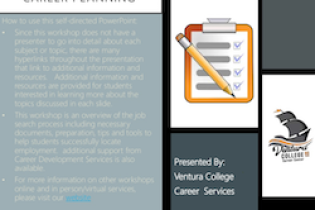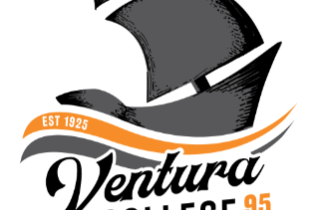Planning For Your Future
Let's make a plan! We can start by creating a set of career goals, strategies and options based on your interests, personality, values and skills. A good outline will help you manage your career and take advantage of changes in the economy and job market.
It's up to you to create a plan for your future and take the necessary actions to obtain the education and training that will support your career plans. However, we're here to help!
Your advisor or career counselor can help you with:
- Your career planning strategy
- How to find information you need
- How to get around obstacles
- How to go about planning your current and long-term education and training
Self Assessments
Understanding yourself is a critical aspect of career and educational exploration and planning. The more you know about your career-related interests, values, skills, personality type and preferences, the better equipped you will be to identify the career fields, major areas of study and education pathways that are compatible with your personal attributes.
Your Work Interests are a reflection of the kinds of work-related activities and tasks you most enjoy doing.
Your Personality Type is a description of how you react to certain situations and people and how you make decisions, organize information and solve problems.
Your Values are a description of what is most important to you in life. For example, you might value earning a lot of money, helping other people, being creative and artistic, having a secure and steady job, etc.
Your Skills are a reflection of your talents and the activities you easily learn and perform well.
Other Things To Think About...
As you start to consider different education and career pathways, keep in mind the kind of lifestyle you'd like to lead. Your career decisions can influence your income, work hours, travel, job security, colleagues and friends, leisure time & where you live.
Here are some more topics that might be helpful to discuss when meeting with an advisor or career councilor:
- Your career-related interests, values, personality and abilities.
- Your present occupational, educational and college/training goals and plans.
- Responsibilities or obstacles that are interfering with your career and college/training decision-making.
- Your life plan, life-style desires and strategies to achieve your goals
- Verifying the rationale of your career decisions and education plans.
- Developing your long-term educational path.
- Pinpointing your personal development needs that will help you to achieve your goals.
- Ways to get around any obstacles that are interfering with your decision-making and planning.
- Formulating strategies and action plans to achieve your career and educational objectives.
Remember, Career Planning is a lifelong process of exploration, and as your interests and aspirations change, so might your career path. Reassess your true goals often, and don't be afraid to make changes to your plan accordingly!


